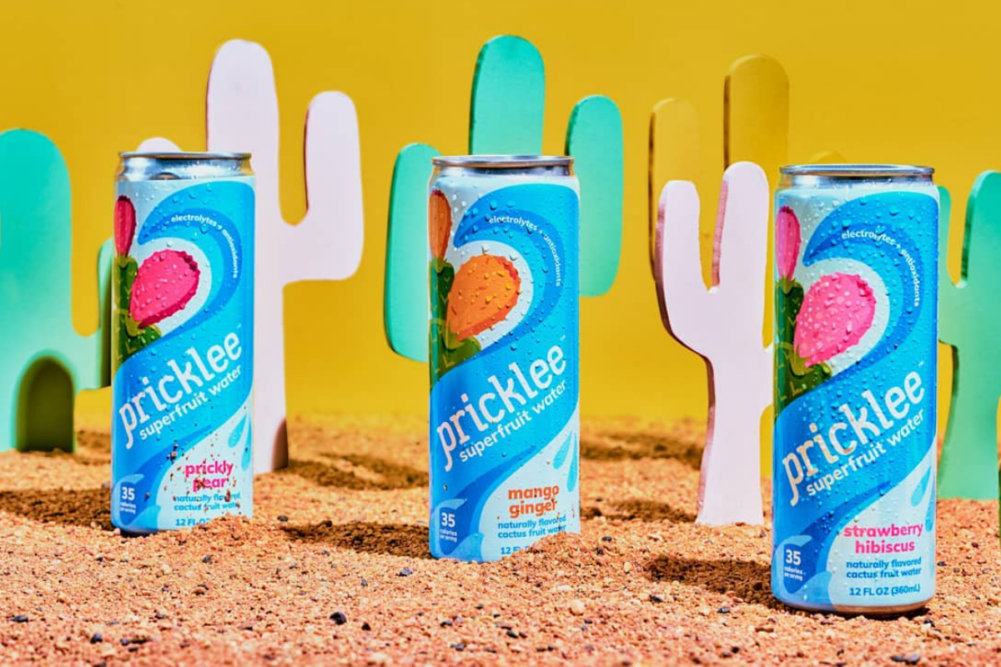BOSTON and NEW YORK — Cactus is the new coconut, if the founders of a fledgling brand of canned beverages featuring prickly pear are reading the market accurately.
Pricklee, a Boston- and New York-based startup launched by five pharmacists, highlights the health and hydration benefits of the cactus fruit in a range of ready-to-drink offerings that contain half the sugar and calories of coconut water.
“The prickly pear is known as an antioxidant powerhouse,” said Kun Yang, co-founder and chief executive officer. “A lot of recovery benefits and immunity benefits come from the antioxidant profile of the fruit itself.”
The drinks, which debuted online this past February, are formulated with filtered water, prickly pear puree, agave nectar and lemon juice. Varieties include original prickly pear, mango ginger and strawberry hibiscus. A 12-oz can contains 35 calories.
While he said coconut water has a sharp flavor, Mr. Yang said cactus water has a pleasant, approachable taste combining hints of watermelon and bubblegum. He first sipped it several summers ago when his then-roommate Mohammed Hassoun returned from a trip to Lebanon, eager to share his favorite childhood refreshment with friends.
“His grandma used to juice the fruit of the cactus for him and his siblings as kids,” Mr. Yang said. “They all loved it in the summertime because it was super-hot, and this is such a refreshing, delicious drink… He brought some cactus fruit back and juiced it and handed it to me. I was like, ‘Since when do cactuses have fruit?’”
Mr. Yang and Mr. Hassoun, along with friends Jaanai Babb, Sarwang Shah and Aakash Dheri, began researching the nutritional profile of prickly pear and partnered to commercialize the concept, which today is available at pricklee.com and in retail stores in the Boston and New York City areas. None of the founders had prior consumer products experience, and all continued to pursue health care careers while building the business, Mr. Yang said.
“The plan is to go full time, at least one or two of us, by the end of this year,” he said.
Cactus water is not new to the market. Several brands, including True Nopal and celebrity-founded Caliwater, market similar products, and Cacti, a cactus hard seltzer, was introduced earlier this year by Anheuser-Busch and recording artist Travis Scott. Mr. Yang believes the popularity of coconut water in recent years will propel mainstream demand for cactus water, an insight gleaned from early testing and consumer surveys.
“Comparing it to coconut water has given us a way to give customers a very easy aha moment of, ‘Oh, I get it. I’ll find this in the grocery store beside a coconut water,’ or ‘I’ll use this the same way I use coconut water in smoothies and mixed drinks, after a workout, after a night out...’” Mr. Yang said. “That’s how we’ve been able to connect with consumers from an education standpoint.”
An abundant and sustainable crop, the prickly pear cactus may be found in more than 30 countries and has numerous uses in Mexican cuisine and culture, Mr. Yang said. Long term, he said the company may explore more possibilities of the cactus in product development, taking a cue from the trending applications of coconut across the supermarket.
“There is so much potential, when you think about the parallels to coconut water, where you see coconut as a superfood in so many ways, from coconut oil to coconut yogurt to coconut milk to coconut chips,” Mr. Yang said. “You see that in cactus as well, in cactus snacks, in cactus tortillas, cactus chips, cactus oil, and a lot of skincare and cosmetic products, too, because of its skin health benefits.
“The potential of the cactus as a hero ingredient in all different forms, the fruit, the pads and everything else as well, is just limitless. Our focus is educating consumers about the benefits of this ingredient and showcasing the many different ways you can use it.”





